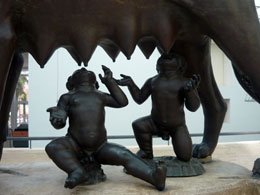Lupa(2019)'15
A she-wolf suckling the mythical twin founders of Rome, Romulus and Remus. "it was a gilt of a baby being given suck from the udders of a wolf."
Discover the captivating tale of Lupa, the She-Wolf, a revered figure in ancient Roman folklore, and her pivotal role in the foundation of Rome. This legendary story embraces themes of motherhood, protection, and divine guidance, leaving an enduring impact on Roman culture and identity.
Unravel the ancient myth of Lupa, the compassionate she-wolf, who came to the rescue of twin brothers, Romulus and Remus. Born to Rhea Silvia, a Vestal Virgin, and the god Mars, their destiny was clouded by their grandfather’s fear of a potential threat to his rule. Abandoned and left adrift in the Tiber River, their providential rescue by Lupa marked the beginning of a legendary journey.
Delve into the profound symbolism of Lupa, whose nurturing embrace of the twins symbolizes divine guidance in the foundation of Rome. This powerful image has endured through the ages, shaping the belief that Rome’s destiny was guided by higher forces and that a caring mother figure played a pivotal role in its formation.
Explore how Lupa’s tale has been masterfully captured in Roman art, sculptures, and monuments, becoming an integral part of the city’s cultural heritage. These artistic representations have ingrained Lupa’s legacy into the hearts of Romans, fostering a deep connection to the virtues of motherhood, protection, and the indomitable spirit that defines Rome.
As Rome stands tall in the modern world, its mythical origins remain etched in the story of Lupa, the She-Wolf. Embrace the timeless symbolism of this legendary figure, symbolizing the enduring values of motherly care, protection, and divine providence. Lupa’s legacy continues to inspire admiration, serving as a potent reminder of the rich cultural heritage that defines the remarkable city of Rome. Explore the captivating tale of Lupa and her significance in Rome’s mythical origins.






